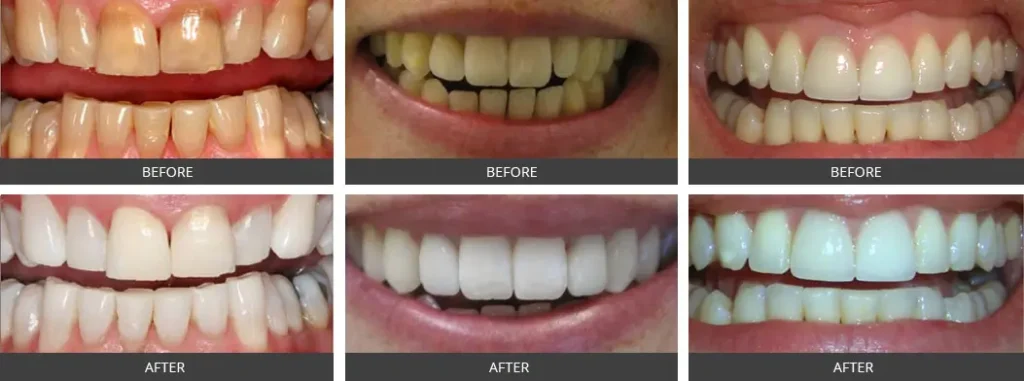Teeth Whitening: Safe & Effective Methods for a Brighter Smile

Introduction to Teeth Whitening
A bright, white smile can boost your confidence and leave a lasting impression. Teeth whitening is one of the most popular cosmetic dental procedures, offering effective solutions for removing stains and discoloration. At F Dental Center, we provide safe and scientifically backed whitening treatments tailored to your needs.
Causes of Tooth Discoloration
Understanding why teeth become stained helps in choosing the right whitening method:
- Extrinsic Stains: Caused by coffee, tea, red wine, smoking, or poor oral hygiene.
- Intrinsic Stains: Result from aging, trauma, or excessive fluoride exposure.
- Medication-Induced: Certain antibiotics (like tetracycline) can darken teeth.
Professional Teeth Whitening: Fast & Long-Lasting Results
For those seeking immediate, noticeable whitening, in-clinic treatments at F Dental Center are the gold standard.
1. Laser/In-Office Bleaching
- Process: Dentist applies a high-concentration peroxide gel (25–40%) and activates it with a special light or laser.
- Time: Just one 60-minute session.
- Results: Teeth become 3–8 shades whiter instantly.
- Best For: Stubborn stains (coffee, smoking) or special occasions.
2. Custom Tray Whitening (Take-Home Professional Kit)
- Stronger than store-bought kits, with carbamide peroxide (10–20%).
- Duration: Wear trays overnight or for 1–2 hours daily (1–2 weeks).
- Safety: Dentist-monitored to prevent sensitivity.
3. Why Choose Professional Whitening?
- Stronger & Safer: Dentists use enamel-safe formulas.
- Customized: Tailored to your teeth’s sensitivity and stain type.
- Longer-Lasting: Results stay bright for 1+ years with proper care.
At-Home Teeth Whitening: Safe & Effective Options
For those who prefer the convenience of whitening their teeth at home, several effective methods are available. While professional teeth whitening at F Dental Center delivers faster and more dramatic results, at-home treatments can still provide noticeable improvements when used correctly.
1. Whitening Toothpaste
- Contains mild abrasives (like silica) and low-concentration bleaching agents (hydrogen peroxide or carbamide peroxide).
- Best for maintaining whiteness after professional treatment.
- Limitation: Only removes surface stains, not deep discoloration.
2. Whitening Strips
- Thin, flexible strips coated with a peroxide-based gel.
- Applied directly to teeth for 30 minutes daily (5–14 days).
- Effectiveness: Can lighten teeth by 1–2 shades.
- Tip: Avoid gums to prevent irritation.
3. Custom-Fit Whitening Trays (From Your Dentist)
- Unlike over-the-counter trays, these are custom-made for your teeth at F Dental Center.
- Filled with professional-grade whitening gel (stronger than store-bought kits).
- Wear for 1–2 hours daily for 1–2 weeks.
- Advantage: More even whitening and reduced gum sensitivity.
4. LED Whitening Kits
- Include a bleaching gel + LED light to accelerate whitening.
- Results in 7–10 days with daily use.
- Caution: Some kits contain high peroxide levels—consult your dentist first.
5. Natural Remedies (Limited Effect)
- Baking soda & hydrogen peroxide paste: Mild whitening but may erode enamel if overused.
- Oil pulling (coconut oil): Reduces bacteria but won’t significantly whiten.
Does Teeth Whitening Damage Enamel?
A common concern addressed:
- Professional treatments are safe when done by experts.
- Overusing DIY kits can weaken enamel or cause sensitivity.
- Tip: Always consult your dentist before starting any whitening regimen.
How Long Do Results Last?
- In-clinic whitening: 6 months–2 years (depends on diet and oral care).
- At-home treatments: 3–6 months.
- Prolong results by avoiding staining foods and smoking.
Who Is a Candidate for Teeth Whitening?
Not everyone benefits equally. Avoid whitening if you have:
- Sensitive teeth or gum disease (treat these first).
- Dental restorations (crowns/veneers won’t whiten).
FAQs About Teeth Whitening
1. Is whitening painful?
Some experience temporary sensitivity, which subsides in 24–48 hours.
2. Can yellow teeth become white?
Yes! Yellow teeth respond best to whitening, while gray/brown stains may need alternatives like veneers.
3. How often can I whiten my teeth?
Once a year for in-clinic treatments; home kits as directed by your dentist.

